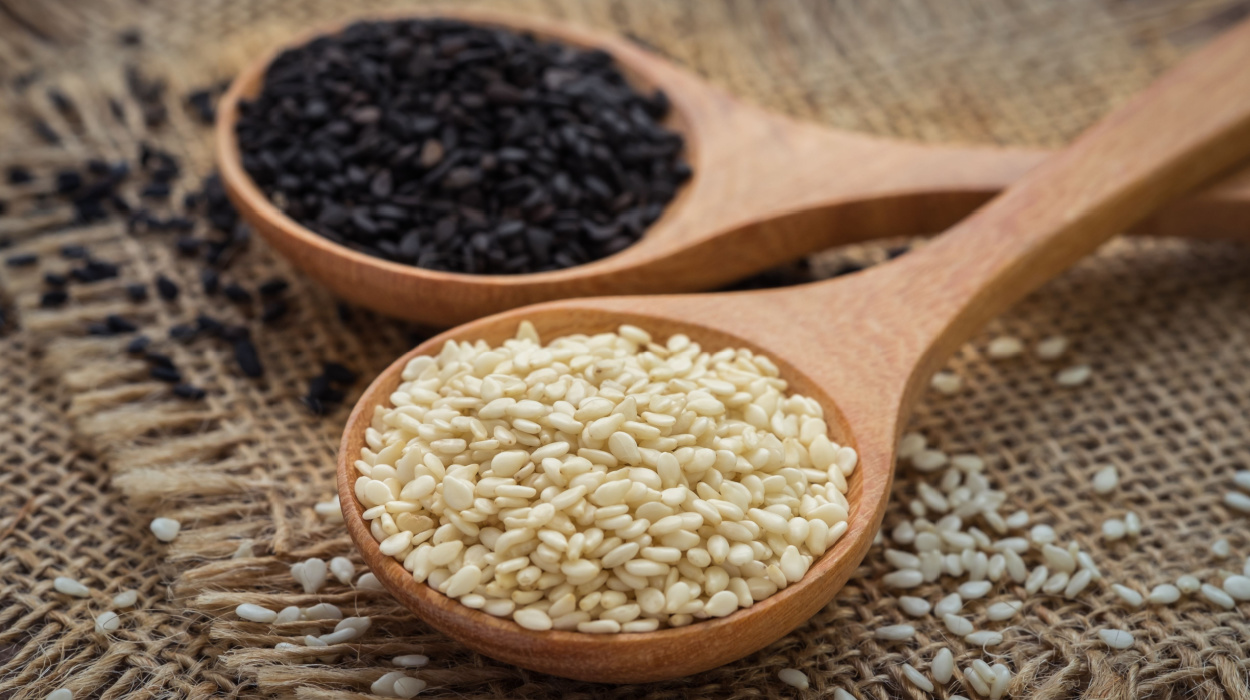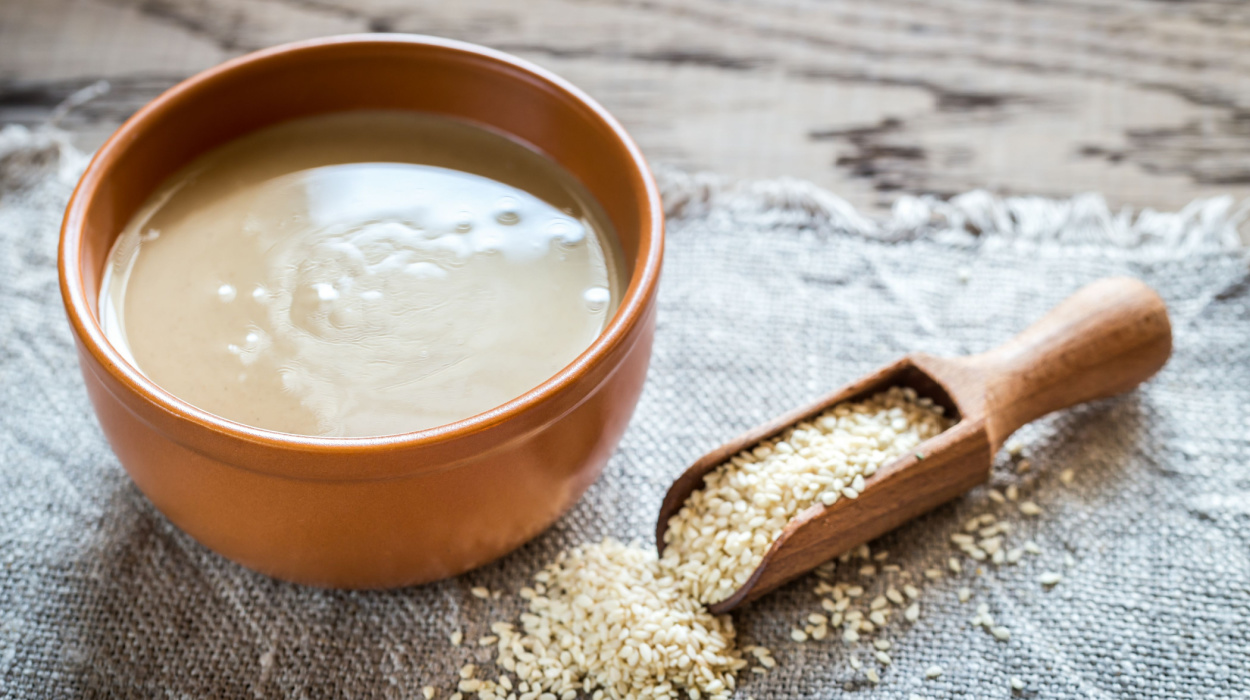Ever considered the mighty sesame seeds benefits? These tiny jewels from the sesame plant are more than just a crunchy garnish on your bagel or stir-fry.
Sesame seeds are a nutritional powerhouse packed with healthy fats, essential amino acids, dietary fiber, and B vitamins. With varieties like white, black, and brown sesame seeds, and even nutrient-dense sesame seed oil, there’s a lot to explore.
From heart health and bone strength to blood pressure control and blood sugar management.
The health benefits of sesame seeds are impressive. Research shows that they are valuable if you want to reduce heart disease risk, lower blood sugar levels, or finally shed those stubborn pounds.
So if you’ve been considering chia seeds vs. flax seeds, or debating hemp seeds vs. chia seeds for your health kick, it’s time to consider sesame seeds. Perfect for weight loss and overall wellness, let’s delve into the top 11 benefits of sesame seeds, according to nutritionists.
Get ready to sprinkle some magic into your diet!
11 Benefits Of Sesame Seeds
- Rich in antioxidants
- Support heart health
- Aid in digestion
- Improve bone health
- Control blood sugar levels
- Enhance skin health
- Boost metabolism
- Support respiratory health
- Help with weight management
- Improve oral health
- Boost your immune system
11 Best Sesame Seeds Benefits For Your Health

Rich In Antioxidants
Sesame seeds are packed with antioxidants, substances that neutralize harmful free radicals in the body. They contain Vitamin E and certain plant compounds with antioxidant properties. The antioxidants in sesame seeds can help reduce oxidative stress,[1] which is linked to chronic diseases.
Support Heart Health
Sesame seeds and sesame seed oil are rich sources of monounsaturated and polyunsaturated fats. As a result, sesame oil can lower blood pressure and reduce your risk of heart disease.[2]
Aid In Digestion
Sesame seeds are high in dietary fiber, which aids in digestion by promoting regular bowel movements.[3] Adding sesame seeds to your meals ensures that your digestive system stays healthy and efficient. Plus, the fiber in sesame seeds can also help prevent constipation and other digestive issues.
Improve Bone Health
Sesame seeds are rich in calcium and vital minerals, making them a boon to bone health. Black sesame seeds[4] stand out as particularly good for bone mineral density. This is good for you whether you’re growing or aging!
Control Blood Sugar Levels
Sesame seeds are high in fiber and healthy fats, properties that help keep your blood sugar levels stable. This makes them a good food choice for those looking to better manage their diabetes.[5]
Enhance Skin Health
Sesame seed oil helps maintain a healthy scalp and protects against skin cancer from harmful ultraviolet rays. In addition, the anti-inflammatory properties of sesame seed oil may help keep your skin healthy and prevent diseases. Scientific research[6] supports the potential health benefits claimed by traditional Chinese medicine.
Boost Metabolism
Sesame seeds are a rich source of several B vitamins.
These vitamins are essential for our body’s metabolism, meaning that sesame seeds can help your body process food more efficiently.
Support Respiratory Health
Inflammation is the primary marker of a lot of respiratory illnesses. The anti-inflammatory properties of sesame seed group oils help with breathing and other systems affected by inflammation.
Help With Weight Management
With their high fiber content, sesame seeds can make you feel full and satisfied, potentially aiding in weight management. Dense nutrition in such a small package can make it easier to meet your nutritional targets.
Improve Oral Health
Sesame seeds and their oils have long been used to perfect oral health and hygiene by reducing bacteria and preventing dry mouth. Sesame oil has long been used for oil pulling, a traditional oral health practice proven to treat gingivitis.[7]
Boost Your Immune System
Sesame seeds are rich in nutrients like zinc and selenium that support the immune system. Some research[8] has found that sesame oil could potentially enhance the production of and health of T cells and other vital components of the immune system.
What Are Sesame Seeds?

Tiny Seeds With Big Benefits
The same indicium plant is native to Africa and India and produces tiny, oil-rich seeds. These resilient plants have a 3000-year history of thriving in all sorts of climates.
Today, sesame seeds and sesame oil are consumed globally and are a vital component of various ethnic cuisines.
Whole Sesame Seeds, Roasted Sesame Seeds, And Dried Sesame Seeds
Sesame seeds are primarily categorized into three types: White, black, and brown, each carrying unique benefits and flavors.
Whole white sesame seeds are usually hulled and have a mild, natural nutty flavor. In contrast, black sesame seeds, often unhulled, taste slightly more bitter but are packed with antioxidants. Finally, brown sesame seeds are the middle ground, offering a balanced, nutty flavor with a powerful nutritional punch.
Roasting sesame seeds enhances the natural nutty flavor and adds a delightful crunch. Alternatively, dried sesame seeds can be ground into sesame seed butter, a nutritious and creamy spread perfect for both sweet and savory dishes.
Sesame Seed Oil
In addition to the seeds themselves, sesame seed oil is a valuable derivative. It’s rich in monounsaturated fats and has a unique flavor that can enhance dishes from all over the world.
Nutrition
These tiny seeds are a nutritional powerhouse.[9] One tablespoon of sesame seeds provides dietary protein, fiber, heart-healthy monounsaturated fats, and essential vitamins and minerals.
Sesame seeds are particularly high in B vitamins, which are vital for metabolic functions. They also have plenty of minerals like magnesium and calcium, crucial for bone health.
Despite their small size, sesame seeds contain nutrients that can significantly contribute to your daily nutritional intake. From maintaining heart health to potentially reducing anxiety, these seeds are worth incorporating into your healthy diet.
So whether you opt for whole sesame seeds, enjoy the crunch of roasted sesame seeds, or savor the creaminess of sesame seed butter, you’re in for a treat.
Sesame Seeds Side Effects
- Allergic Reactions: Sesame allergies are increasingly common, with symptoms ranging from mild (hives, stomach pain) to severe (anaphylaxis).
- Medication Interactions: Sesame seeds can interact with certain medications, including those for high blood pressure and kidney disease.
- Overconsumption Risk: Consuming sesame seeds in excess might lead to digestive issues due to their high fiber content.
How To Eat Sesame Seeds?
- Breakfast Boost: Toast sesame seeds until golden brown, then sprinkle on your morning toast or cereal for a nutritional punch and extra crunch.
- Salad Toss: Add toasted sesame seeds to your salad for a crunchy texture, or whip up a dressing using sesame seed oil, vinegar, and a touch of honey.
- Cooking Oil: Use sesame seed oil to stir-fry veggies, imparting a unique flavor while reaping its heart health benefits.
- Sweet Treats: For dessert, bake sesame seed cookies. All you have to do is mix ground sesame seeds into your cookie dough, bake until golden brown, and enjoy!
- Asian Cuisine: Enhance your sushi or stir-fries with black sesame seeds for added color and nutrition.
Conclusion
Sesame seeds are tiny but mighty. With their many health benefits, from boosting heart health to aiding digestion, they’re worth incorporating into your diet. Whether toasted on your breakfast, incorporated into your salads, or baked into cookies, sesame seeds add a nutritious and tasty twist to your meals. So embrace these versatile seeds and enjoy their numerous advantages!
Frequently Asked Questions
Sesame seeds offer a range of health benefits. They’re rich in antioxidants, support heart health, aid in digestion, improve bone health, and control blood sugar levels. They also enhance skin health, boost metabolism, help respiratory health, support weight management, and improve oral health.
While there are no strict guidelines, a daily intake of about a handful (30g) of sesame seeds should provide you with their nutritional benefits without causing overconsumption issues.
Yes, sesame seeds are high in fiber which aids in digestion and promotes a healthy gut.
While it is not a scientifically defined term, sesame seeds could be considered as such due to their dense nutritional profile, including essential fatty acids, vitamins, minerals, and antioxidants.
Regular consumption of sesame seeds can offer numerous health benefits, including improved heart and gut health, better blood sugar control, and enhanced bone and skin health. However, moderation is key to avoiding potential digestive discomfort.
Yes, some people may have a sesame allergy which can cause mild reactions. Also, sesame seeds may interact with certain medications for high blood pressure and kidney disease.
Sesame seeds are incredibly versatile. Add them to breakfast cereals, salads, and stir-fries, use sesame seed oil in cooking, or enjoy them in desserts like cookies. They also feature prominently in Middle Eastern dishes.
 Expert's opinion
Expert's opinion
